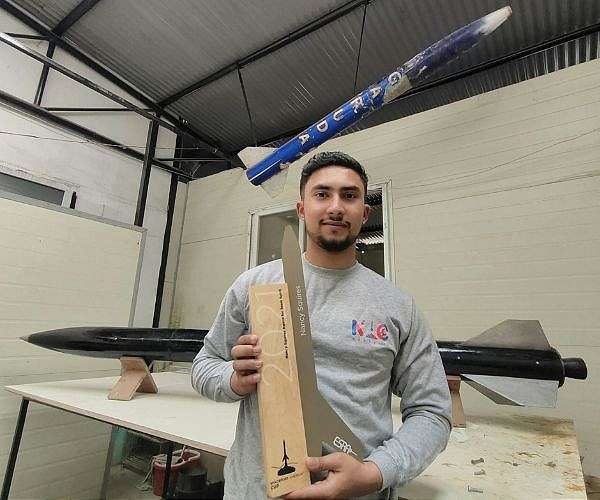From Garuda to pioneering Nepal’s space technology industry
Simon Mansfield
Sydney, Australia (SPX) July 25, 2024
In the Himalayan nation of Nepal, two innovators, Mohan Tamang and Akrit Dhungel, are making history with the country’s first space tech startup, Mach24Orbitals.
Dhungel and Tamang previously led the Garuda project, which launched Nepal’s first rocket on March 20, 2021. The project won the Nancy Squires Team Spirit Award at the Spaceport America Cup 2021. Garuda, which used potassium nitrate and sugar as fuel, marked a significant milestone and paved the way for Mach24 Orbitals. In collaboration with organizations such as the Nepalese Army, National Innovation Center, and Nepal Academy of Science and Technology (NAST), they have conducted test launches of more than 15 rockets across Nepal, steadily progressing towards their goal.
Garuda’s success, fuelled by solid rocket fuel, was just the beginning. Mach24Orbitals is currently developing hybrid rocket engines using liquid oxygen (LOx) and paraffin wax. These engines promise greater efficiency and reduced costs, making space exploration more accessible. Garuda’s key technical details include potassium nitrate and sugar fuel, and its launch date is March 20, 2021, making it the first rocket to be launched in Nepal. The hybrid rocket engine’s fuel will consist of liquid oxygen (LOx) and paraffin wax, which will provide greater efficiency, reduced costs and improved reliability, with a payload of up to 500 kg.
The small satellite market is expanding rapidly, driven by the demand for satellite-based services such as Earth observation and communications. Market analysts predict that the sector will reach $27.6 billion by 2030, growing at a compound annual growth rate of 20.1% from 2021 to 2030. This growth is primarily driven by technological advancements and decreasing launch costs.
Combining the advantages of solid and liquid propulsion, hybrid rockets are emerging as a cost-effective solution for space exploration. The hybrid engine developed by Mach24Orbitals offers several advantages, including improved safety due to the separation of fuel and oxidizer, lower manufacturing and operating costs compared to traditional liquid rockets, and versatility suitable for a variety of applications, from launching small satellites to deep space missions.
Mach24Orbitals signed a letter of intent to further its collaboration with NAST. The company’s roadmap includes a proof-of-concept launch in 2025, suborbital testing in 2026, and full-scale operations by 2027. These plans are in line with the small satellite market, which is expected to reach $27.6 billion by 2030.
Nepal has demonstrated that despite limited resources, great challenges can be overcome with determination and vision. Mach24Orbitals’ achievements will inspire future generations to pursue ambitious goals in the field of space technology globally. The small satellite market continues to grow, with more satellites being launched every year. Hybrid rockets address this demand with a sustainable solution that combines the advantages of solid and liquid propulsion technologies.
Related Links
Mac24 Orbitals
Commercial Satellite Industry Update

